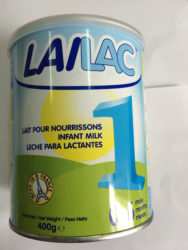Concerns over limitations to the capacity of the Government Food and Drug Analyst Department (GA-FDD) to effectively monitor the importation of suspected fake foods—particularly milk—into the country and more importantly to prevent the imports from being placed on the local market are raising questions as to whether this deficiency is not now putting at serious risk the health of local consumers including, worryingly, children whose diet includes a significant intake of manufactured infant formula.
During two recent interviews with the department’s Director Marlon Cole, this newspaper was told that there were, indeed, considerable limitations to the local capacity to monitor and control the importation of fake foods into Guyana, a circumstance which he said had been occasioned both by institutional limitations and by the indifference of some importers to import regulations. Apart from the fact that monitoring limitations render it difficult for the department to become aware of the presence of some imports until they were landed and in some instances distributed, this newspaper was informed that there had been instances in which importers had sought to secure permits for the import of some foods only after they had been landed here.

Cole explained that in such circumstances, what this meant was that the department was being put under pressure to track down goods after they had left ports of entry or even after they might have been placed on shelves at retail outlets.
For some months now the GA-FDD has been embroiled in an exchange with local distributor, International Pharmaceu-tical Agency (IPA) Guyana Ltd over the importation and distribution of a product named Lailac Infant Milk intended for consumption by babies. This newspaper understands that in February this year IPA had appealed a decision by the GA-FDD to prohibit the distribution and sale of the product on the grounds that (1) the importer has been unable to provide evidence that the product is freely sold and distributed in the country in which it is produced, a condition necessary to enable compliance with Food and Drug Regulation 12 of 1977; the product is labelled infant milk despite the fact that in the production process vegetable oils were used to replace milk fat in contravention of Codex Alimentarius 1986, a collection of internationally recognized standards, codes of practice, guidelines, and other recommendations relating to foods, food production, and food safety. Additionally, the GA-FDD is reportedly contending that it has no information on the vegetable oil used in the product. This newspaper has also been informed that the GA-FDD has been notified of complaints made by the Materials Management Unit of the Ministry of Public Health regarding defective batches of the infant milk.
Cole has in the past told this newspaper that there are a number of manufacturers and importers of foods who are not in compliance with the regulations and this newspaper has confirmed cases of transgression of food safety regulations in some cottage industry-scale local agro processing entities.





